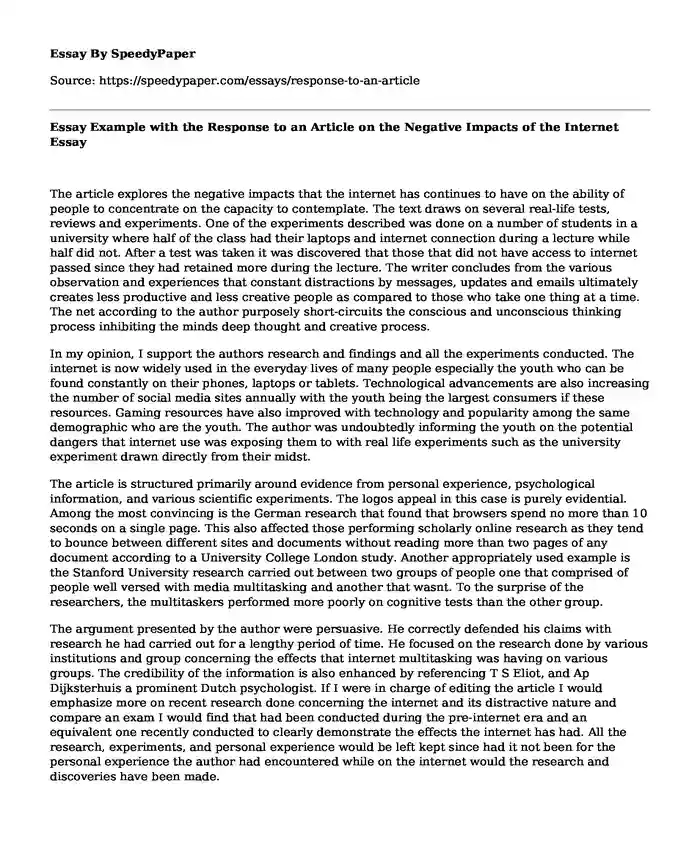The article explores the negative impacts that the internet has continues to have on the ability of people to concentrate on the capacity to contemplate. The text draws on several real-life tests, reviews and experiments. One of the experiments described was done on a number of students in a university where half of the class had their laptops and internet connection during a lecture while half did not. After a test was taken it was discovered that those that did not have access to internet passed since they had retained more during the lecture. The writer concludes from the various observation and experiences that constant distractions by messages, updates and emails ultimately creates less productive and less creative people as compared to those who take one thing at a time. The net according to the author purposely short-circuits the conscious and unconscious thinking process inhibiting the minds deep thought and creative process.
In my opinion, I support the authors research and findings and all the experiments conducted. The internet is now widely used in the everyday lives of many people especially the youth who can be found constantly on their phones, laptops or tablets. Technological advancements are also increasing the number of social media sites annually with the youth being the largest consumers if these resources. Gaming resources have also improved with technology and popularity among the same demographic who are the youth. The author was undoubtedly informing the youth on the potential dangers that internet use was exposing them to with real life experiments such as the university experiment drawn directly from their midst.
The article is structured primarily around evidence from personal experience, psychological information, and various scientific experiments. The logos appeal in this case is purely evidential. Among the most convincing is the German research that found that browsers spend no more than 10 seconds on a single page. This also affected those performing scholarly online research as they tend to bounce between different sites and documents without reading more than two pages of any document according to a University College London study. Another appropriately used example is the Stanford University research carried out between two groups of people one that comprised of people well versed with media multitasking and another that wasnt. To the surprise of the researchers, the multitaskers performed more poorly on cognitive tests than the other group.
The argument presented by the author were persuasive. He correctly defended his claims with research he had carried out for a lengthy period of time. He focused on the research done by various institutions and group concerning the effects that internet multitasking was having on various groups. The credibility of the information is also enhanced by referencing T S Eliot, and Ap Dijksterhuis a prominent Dutch psychologist. If I were in charge of editing the article I would emphasize more on recent research done concerning the internet and its distractive nature and compare an exam I would find that had been conducted during the pre-internet era and an equivalent one recently conducted to clearly demonstrate the effects the internet has had. All the research, experiments, and personal experience would be left kept since had it not been for the personal experience the author had encountered while on the internet would the research and discoveries have been made.
References
How the Internet is making us stupid - Telegraph. (n.d.). Retrieved from http://www.telegraph.co.uk/technology/internet/7967894/How-the-Internet-is-making-us-stupid.html
Cite this page
Essay Example with the Response to an Article on the Negative Impacts of the Internet . (2019, Oct 16). Retrieved from https://speedypaper.net/essays/response-to-an-article
Request Removal
If you are the original author of this essay and no longer wish to have it published on the SpeedyPaper website, please click below to request its removal:
- Essay Sample about Operational Contract Support in the Military
- Free Essay on Oakley City Development
- Application Example for Master's Degree in Information Technology
- Free Essay with the Internship Letter Example
- Free Essay Answering How The Crucible Is an Allegory for McCarthyism
- Essay Sample on Working Memory and Spatial Relations Skill in Autistic Children
- Medicine Essay Sample: Pediatric Infections Diagnosis
Popular categories





